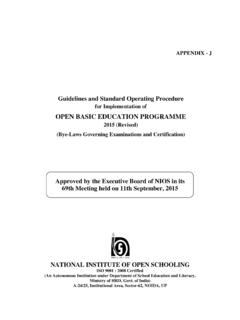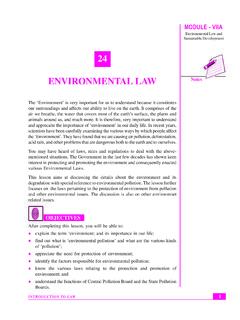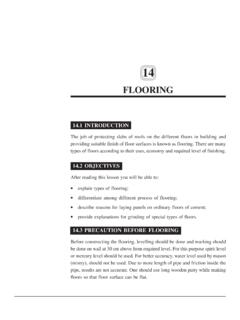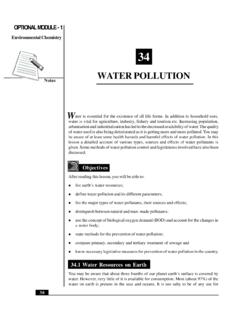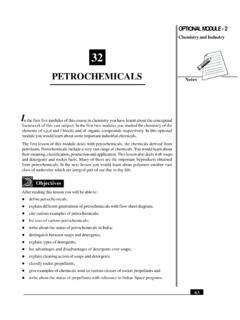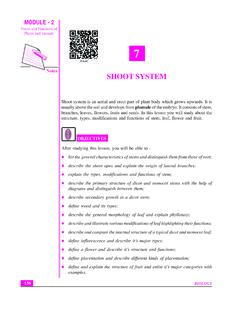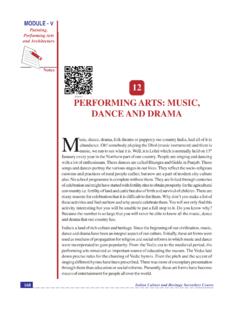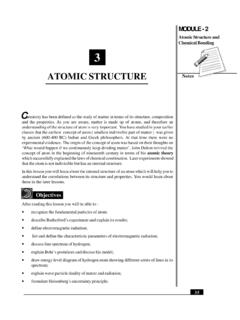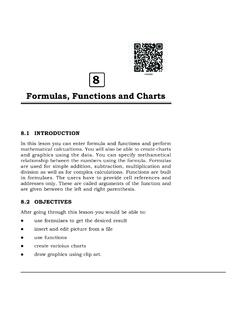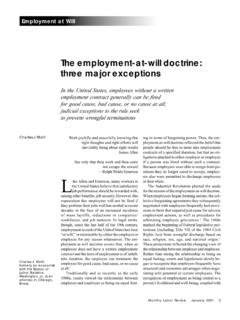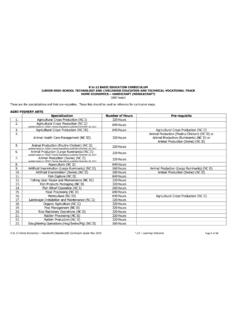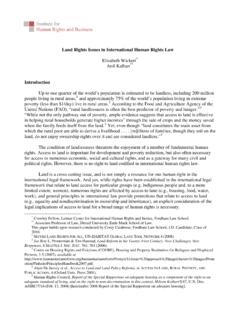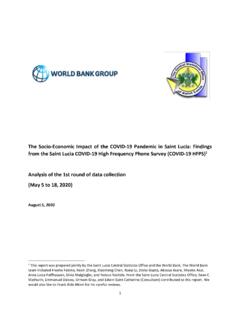Transcription of NATURE AND SCOPE OF BUSINESS
1 3 NotesMODULE - 1 BUSINESS Around UsBUSINESS STUDIES1In your day-to-day life you may be engaged in several activities. However, when someone asks you as to what you want to become in your life or what you want to do infuture, your answer may be I want to join a suitable job or I want to become adoctor, an engineer, a dancer or a musician , or you may say, I want to do my ownbusiness . But why do you want to do any of such activities? Obviously, it is mainly toearn your livelihood. Broadly speaking, every human activity in which one is engagedfor the purpose of earning one s livelihood is known as economic activity. In this lessonwe shall learn about all such activities, their categorisation and some other studying this lesson, you will be able to: define human activities; classify human activities as economic and non-economic activities; explain the role of profit in BUSINESS ; explain the meaning and characteristics of different categories of economic activities; explain the concept of BUSINESS and distinguish it from profession and employment; describe the objectives and importance of BUSINESS in modern society; and identify different types of BUSINESS activities.
2 HUMAN ACTIVITIESE very human being is engaged in one activity or the other. It may be cultivating land,preparing food, playing football, reading storybooks, studying in a school, teaching in aNATURE AND SCOPE OF BUSINESSOBJECTIVES4 NotesMODULE - 1 BUSINESS Around UsBUSINESS STUDIES college, working in an office, jogging in the park and so on. If you try to ascertain as towhy individuals engage themselves in one activity or the other, you will find that bydoing such activities they are trying to satisfy some of their needs or wants. All theseactivities which human beings undertake to satisfy their needs or wants are called , even if all human activities satisfy the needs and wants, they differ amongeach other in terms of the purpose for which they are undertaken and the end example, let us take the activity of preparing food one prepared by a mother athome for her family and the other by a cook in a hotel. Here you will notice that thepurpose and end result of the activity of preparing food (a) by a mother and (b) by acook varies.
3 In the first case, the purpose is to feed the family members without anyexpectation of monetary return while in the second case, cooking food is a part of hisjob so as to earn money in terms of salary or wage. The end result in the first case is self-satisfaction and looking after the family, while in the second case it is earningmoney for human activities that are undertaken with an objective to earn money or livelihoodare called economic activities. Whereas the other types of activities that are undertakento derive self-satisfaction, are called non-economic activities. A farmer growing crops,a worker working in a factory for wage/salary, a businessman engaged in buying andselling of goods are examples of economic activities. While activities like meditation,engaging in sports for physical fitness, listening to music, providing relief to flood victimsetc., are examples of non-economic Define economic activities .2. Below are given certain non-economic activities.
4 Convert them into :A nurse attending her ailing son. (Non-economic activity)A nurse attending patients in her hospital. (Economic activity)(a) A person working in his own garden.(b) A lady preparing food for her husband.(c) A man white-washing his own house.(d) A teacher teaching his son at home.(e) A chartered accountant preparing his own QUESTIONS and SCOPE of Business5 NotesMODULE - 1 BUSINESS Around UsBUSINESS STUDIES CLASSIFICATION OF ECONOMIC ACTIVITIESE conomic activity can be a one-shot affair or a continuous one. For example, youknow how to stitch clothes and one day you stitch a shirt for your friend and he payssome money to you. Of course, this is an economic activity as you have some monetarygain but it is a one-shot affair. But, if you start stitching shirts on a continuous basis andcharge money for that, you are said to be engaged in some continuous or regulareconomic activity. It may be noted that by getting themselves engaged regularly in aparticular economic activity people try to earn their livelihood.
5 So, the activities inwhich individuals engage themselves on a regular basis and earn their livelihood areknown as their occupations .In fact everyone is engaged in one occupation or the other, and these can be broadlycategorised as (a) Profession;(b) Employment; and(c) us know a few more details about these ProfessionYou are aware of doctors. What are they and what do they do? They are basicallyindividuals who have a special knowledge and training to examine the patients, find outthe ailment, if any, and then treat them to be cured from such ailment. And, for doing allthese they charge a fee from patients. Similarly, we have Chartered Accountants whospecialise in matters related to accounts, taxes etc. and help people and organisationsfor such jobs for a fee. If we look further, we find Engineers, Architects, Film-stars,Dancers, Artists and many others engaged in their own field having specialised knowledgeand training. They are all known as professionals and the activities they are engaged inare called order to gain clarity on the concept of a profession, let us look at its basic featureswhich can be summarised as follows:(a) Profession is an occupation for which the individual has to acquire a specialknowledge and skill.
6 (b) The money they get for providing such a service is usually known as fee .(c) Most of the professionals are regulated by a professional body, which frames thecode of conduct to be followed by the member professionals. For example,Chartered Accountants in India are regulated by a professional body known asInstitutes of Chartered Accountants of India, Cricketers by International CricketCouncil (ICC), and so and SCOPE of Business6 NotesMODULE - 1 BUSINESS Around UsBUSINESS STUDIES(d) Professionals acquire the specialised knowledge mostly from colleges, universitiesor specialised institutes. In some cases, individuals also acquire such knowledgeand skill through training or coaching by an expert in the same field, say for example,dancers and musicians, etc.(e) Professionals usually work on their own and get a fee for their services and termedas those in practice. However, some of them may work in organisations asemployees or consultants.
7 (f) The primary objective of every profession is to provide service though they maycharge a fee. They should not exploit the people using their knowledge of those economic activities which involves the rendering ofpersonal service of specialised and expert NATURE based onprofessional training and skill and require the observance of certainrules and regulations (code of conduct) are termed as EmploymentYou have seen people going regularly to offices, factories, firms etc. for work. Theseare individuals who are engaged by organisations or individuals to work for them inreturn for a wage or salary. They are said to be in employment. Thus, we find a postmanis in employment in the department of posts to deliver letters. Here the department iscalled the employer and the postman is the employee. The postman works on the basisof certain terms and conditions and gets a monthly salary in return. The main features ofemployment are:(a) It is an occupation where a person (called employee) is to work for another (calledemployer).
8 (b) There are certain terms and conditions of work like hours of work (how manyhours a day), duration of work (how many days or hours in a week or month etc.),leave facility, salary/wages, place of work etc.(c) The employees get salary (normally paid on a monthly basis) or wage (normallypaid on daily/weekly basis) in return of their work. This amount is normallypredetermined, mutually agreed upon and may increase over time.(d) Legally the employer-employee relationship is based on a contract and any deviationfrom any side permits the other party to take legal recourse.(e) There are jobs for which no technical education or specialised skill is required foremployment. But, for skilled jobs, specialised jobs and technical jobs, a certainlevel of basic/technical education is required.(f) The main purpose behind employment is to secure assured income through wagesand and SCOPE of Business7 NotesMODULE - 1 BUSINESS Around UsBUSINESS STUDIESThe economic activity, rendered by one person to another, under acontract of service, for some remuneration, is called BusinessYou must have heard about Tata Companies.
9 They manufacture so many things fromsalt to trucks and buses and sell these to individuals like you and me. In the process,they earn a profit. Look at a shopkeeper nearby. What does he do? He buys productsin bulk and sells us in small quantities. He also earns some profit in the process. Similarly,the cable TV operator provides us a connection at a price so that we watch variouschannels on our television set. In this process the cable TV operator earns a profit. Allof them are said to be engaged in BUSINESS and are called businessmen. They all performtheir activities regularly to earn profit. Thus, the term BUSINESS refers to human activitieswhich involve production or exchange of goods and services regularly with the objectof earning may be defined as an activity involving regular productionor purchase of goods and services for sale, transfer and exchangewith the object of earning find people like mill owners, transporters, bankers, traders, tailors, taxi operatorsetc.
10 Doing BUSINESS . All of them are engaged in an activity of manufacturing or trading(buying and selling) or providing some service. They have invested their money, bearthe risks involved and work for earning some profit. Thus, the main characteristics ofbusiness are:(a) It is an occupation where a person is engaged in manufacturing or buying andselling of goods and services. The goods may be consumer goods or capital the services may be in the form of transportation, banking, insurance etc.(b) The activities must be carried on regularly. A single transaction is usually not treatedas a BUSINESS . For example, if a person sells his old car at a profit, it is not treatedas a BUSINESS activity. However, if he is engaged in the activity of buying old carsand selling them on a regular basis, he shall be treated as engaged in businessactivity.(c) The sole objective of BUSINESS is to earn profit. It is essential for the survival ofbusiness.
